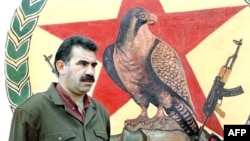The Kurdistan Workers Party, or PKK, has announced it is dissolving its organizational structure and ending its decades-long armed struggle against Turkey, marking a historic shift after more than 40 years of conflict that has led to the deaths of tens of thousands of people.
The decision, announced on May 12, marks a significant step toward ending one of the region's longest and deadliest insurgencies, with the group now calling for the Kurdish issue to be resolved through democratic means.
The PKK: From Cultural Rights To Armed Insurgency To Disbanding
The Kurdistan Workers Party (PKK) is a Kurdish militant organization founded in 1978 by Abdullah Ocalan and others with the aim of establishing an independent Kurdish state or achieving greater Kurdish autonomy within Turkey.
The PKK initially sought to promote Kurdish cultural rights and political recognition but later embraced a more armed insurgency to pursue its objectives. It is considered a terrorist organization by Turkey, the United States, the European Union, and several other countries, due to its involvement in numerous attacks, bombings, and clashes resulting in civilian and military casualties.
The PKK operates predominantly in southeastern Turkey, as well as in parts of Iraq, Syria, and Iran where Kurdish populations reside. Over the years, the group has experienced periods of cease-fire and peace talks, especially during the early 2010s, but conflicts have largely continued. The PKK's ideology combines Kurdish nationalism with socialist principles, emphasizing Kurdish cultural rights, gender equality, and social justice.
The Turkish government has regarded the PKK as a major threat to national security, advocating strong military action against the group. Conversely, some Kurdish groups and international entities view the PKK as a liberation movement fighting for minority rights and self-determination.
The decision was made during the group's 12th congress, held last week in northern Iraq, and comes in response to a call from its imprisoned leader, Abdullah Ocalan, who urged the group in February to lay down arms and pursue peace. The announcement was first reported by the Firat News Agency, an affiliate of PKK.
"The 12th PKK Congress has decided to dissolve the PKK's organizational structure and end its method of armed struggle," the group said in a statement. "As a result, activities carried out under the name 'PKK' were formally terminated."
Wladimir van Wilgenburg, a political analyst specializing in Kurdish affairs, told RFE/RL that the Kurdish community in Turkey had grown "tired of the conflict and is hoping for peace."
However, he added that Kurds were not sure whether they could trust the Turkish government and wondered if Ankara would take steps toward reconciliation, such as releasing Kurdish politician Selahattin Demirtas and recognizing Kurdish rights.
"So, they're a bit mistrustful and unsure about what will happen," van Wilgenburg said.
Resolution Through Democratic Means
The PKK said the practical process of dissolution and disarmament will be managed and overseen by Ocalan, who has been incarcerated on an island near Istanbul since 1999.
According to the congress declaration, the PKK's struggle had "brought the Kurdish issue to the point of resolution through democratic politics, thus completing its historical mission."
The group did not elaborate on what the exactly means, but van Wilgenburg said it was unlikely PKK commanders would enter Turkish politics, seeing as there already is an active pro-Kurdish party in Turkey in the form of Peoples' Democratic Party (HDP).
"Most likely they mean that from now on Kurdish politics will be conducted through legal politics and the Turkish parliament, not guerrilla warfare," he added.
The PKK, designated a terrorist organization by Turkey, the United States, and the European Union, began its insurgency in 1984 with the initial aim of creating an independent Kurdish state. In recent years, its demands shifted toward greater autonomy and rights for Kurds within Turkey.
United, But To What Extent?
Earlier this year, the PKK declared a unilateral cease-fire, stating it was "to pave the way for...peace and democratic society," but set conditions including the creation of a legal framework for peace negotiations.
The group's statement said its mission had been completed and expressed hope that Kurdish political parties would "fulfill their responsibilities in developing Kurdish democracy and ensure the formation of a Kurdish democratic nation."
Van Wilgenburg noted that while PKK seems united in its decision, the organization has had issues with splinter groups in the past, such as when Ocalan's younger brother Osman Ocalan broke away and formed his own short-lived political-military group in 2004.
One key question, van Wilgenburg said, is whether the organization's affiliates in other countries, such as Iran, will abide by the decision or continue their struggle.
Omer Celik, a spokesman for Turkey's ruling Justice and Development Party (AKP), demanded on May 12 that the PKK's decision to disarm and disband be implemented "concretely and in full as well as in a manner comprising all of the PKK's branches."
It is estimated that 40,000 people have lost their lives in the PKK-Turkey conflict, with some casualties resulting from PKK attacks on military and civilian targets, as well as Turkish military operations against the group and the communities that supported it.









